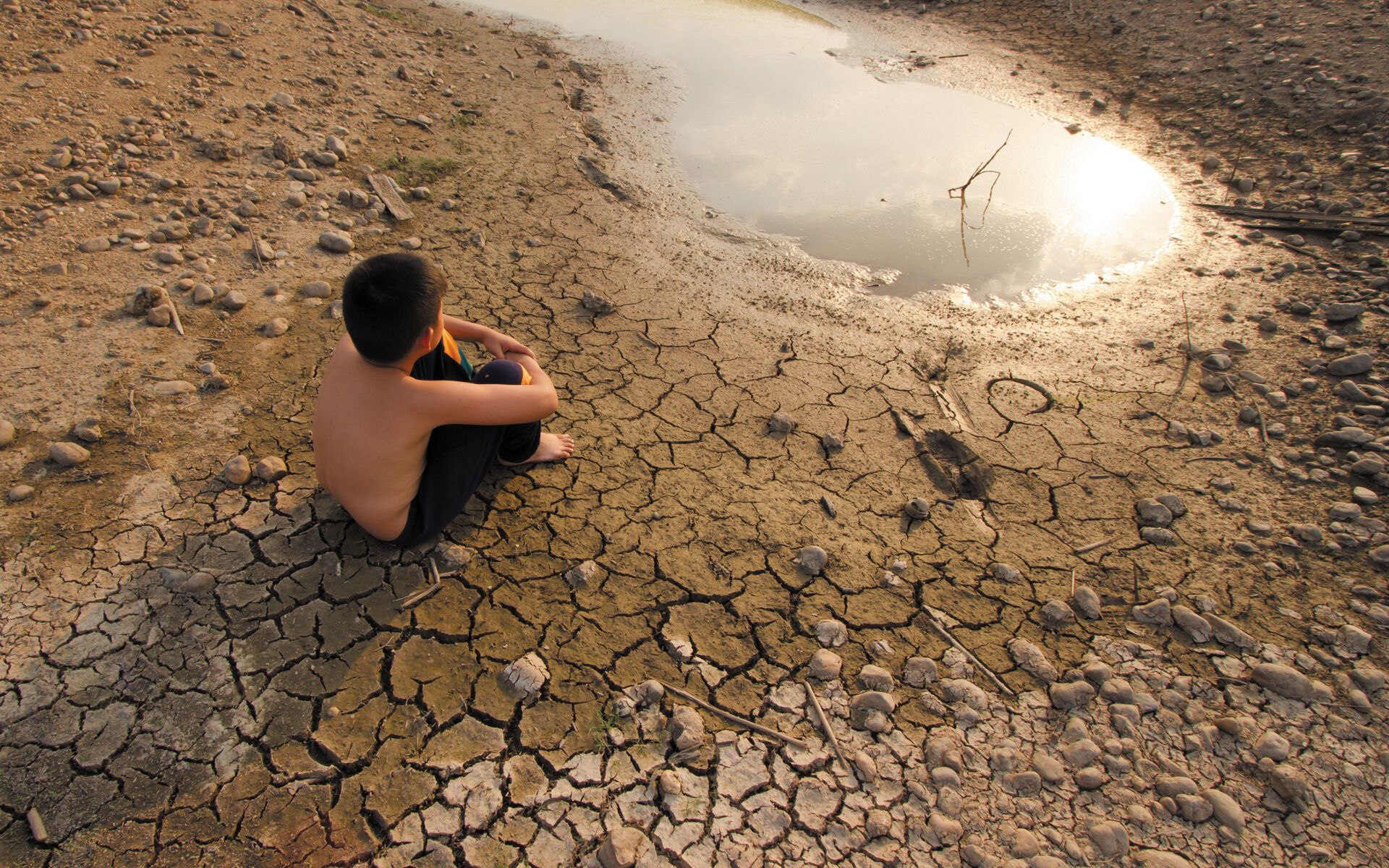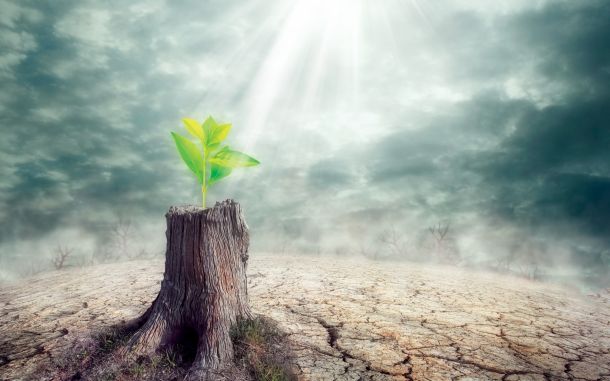Climate Change and Our Health

In This Article
-
In 2021, the World Health Organization declared climate change “the greatest health threat facing humanity.”
-
Unless addressed in tandem with population growth, migration, rapid and unplanned urbanization, surging scarcity in resources and food, extreme poverty, socioeconomic inequality, infectious diseases, and pandemics, climate change will cause erratic and insurmountable problems facing humanity.
-
Climate change puts the three pillars of health—nutrition, shelter, and access to water—at risk. Natural disasters destroy crops and people’s homes and contaminate safe water sources. This leads to malnutrition and water-borne diseases and contributes to 12.6 million preventable deaths in the world each year.
At the 26th United Nations Climate Change Conference in Glasgow, Scotland, countries signed an agreement on a series of measures to address climate change. The agreement includes key decisions such as a commitment to phase out coal, regular reviews of emission reduction plans and more financial support for developing countries. Climate change, which can be defined as “changes in the average state and variability of the climate over decades or longer, regardless of cause,” is in fact the scream that resonates off the walls of the ecosystem. Unless addressed in tandem with population growth, migration, rapid and unplanned urbanization, surging scarcity in resources and food, extreme poverty, socioeconomic inequality, infectious diseases, and pandemics, climate change will cause erratic and insurmountable problems facing humanity and, as during the recent COVID-19 pandemic, it can upset established social behavior patterns.
The greatest danger knocking at our door
In 2021, the World Health Organization declared climate change “the greatest health threat facing humanity.” Climate change and increasing carbon dioxide emissions cause extreme heat, environmental destruction, and difficulties in the water and food supplies. Using fossil fuels, the main source of greenhouse gases, leads to air pollution and associated premature deaths. Increases in carbon monoxide, lead, nitrogen dioxide, sulphur dioxide, ozone, and respirable particulate matter smaller than 2.5 microns are the main drivers of air pollution. The vicious cycle between climate change and air pollution is associated with reproductive, respiratory, and cardiovascular diseases, as well as public health problems such as diabetes, cancer, premature aging, and psychiatric diseases. Climate change causes an increase in air pollution through extreme temperature and weather events (hurricanes, floods, droughts), natural (wildfire smoke, dust storms), and human and animal factors (air conditioning, litter). It also contributes to infectious diseases through expanded habitats for disease vectors such as mosquitoes and ticks, and to non-communicable diseases through increasing food shortages, malnutrition, and longer and more intense pollen seasons.
Temperatures and Drought
Although humankind is not fully aware of the impending catastrophe, the gravity of the situation is highlighted by reports on Europe experiencing its driest spell in 500 years, with more than half of the continent facing the threat of drought. Drought threatens not only Europe but the whole world, leading to water and food shortages as well as an increase in forest fires. It is noted that around 2.3 billion people live in areas at risk of drought, that drought has directly caused the deaths of 650,000 people in the last 50 years, and that millions of children are still affected by severe and prolonged drought. It is also estimated that as many as 3.5 billion people could face “unlivable” temperatures in the next 50 years because of human-induced climate change. As more people are impacted by drought, chronic poverty, war, or chaos, they will continue to migrate to “milder” locales.
Impact on marine ecosystems and ocean pollution
The quality of marine environments is also essential for protecting public health. Environmental pollution, contamination by chemicals, and pathogenic microbes hurt marine ecosystems; marine pollution also threatens marine animals and human health. Ocean pollution, exacerbated by global climate change, also negatively affects these ecosystems, with petroleum-based pollutants causing a decrease in photosynthesis in oxygen-producing organisms. Increased carbon dioxide absorption in the seas causes acidification, negatively affecting coral reefs, disrupting shellfish growth, dissolving calcium-containing microorganisms at the base of the marine food web, and increasing toxic effects from pollutants. Meanwhile, plastic pollution, which accumulates in large mid-ocean gyres and threatens marine mammals, fish, and seabirds, decomposes into chemical micro- and nano-plastic particles that enter the tissues of many marine organisms, including those consumed by humans. Industrial sewage increases the frequency and impact of harmful algal blooms, bacterial pollution, and anti-microbial resistance, while dangerous pathogens such as Vibrio species and other factors result in global declines in fish stocks.
Effects of air pollution
Climate change puts the three pillars of health—nutrition, shelter, and access to water—at risk. For instance, natural disasters destroy crops and people’s homes and contaminate safe water sources. This leads to malnutrition and water-borne diseases and contributes to 12.6 million preventable deaths in the world each year due to climate change. Since more than half of these deaths are caused by exposure to air pollution, it is clear that there is an association between climate change and air pollution and other environmental exposures. Longer wildfire seasons lead to more smoke exposure; climate change affects ozone and particulate matter formation by increasing the rate of chemical reactions in the atmosphere and increases the amount of pollen by extending the pollen season. The direct effect of each event is airway inflammation and lung damage due to the production of reactive oxidants. Ambient ozone and chronic accumulation of particulate matter in alveolar macrophages, impaired phagocytosis, oxidative stress, and poor mucociliary clearance jointly trigger airway inflammation. In addition to weakened antioxidant defenses, immunological and epigenetic (environmentally induced) changes play a role in the pathogenesis of lung diseases such as asthma and chronic bronchitis. Toxic effects in the respiratory tract and lungs eventually impact the cardiovascular system, causing autonomic disorders and increased inflammation. Ultimately, climate change-induced air pollution affects nearly every organ system (including the lungs, heart, kidneys, brain, and nervous system) through a complex interplay of increased oxidative stress, systemic inflammation, and immune dysregulation.
What can be done?
Climate change negatively affects several social determinants, such as equity, livelihoods, and access to health and social support services. Its impacts are felt disproportionately by the most vulnerable and disadvantaged, including women, children, ethnic minorities and impoverished communities, migrants or the elderly, and those with disabilities. Due to climate change, health services are in greater demand, while infrastructure is negatively affected. Faced with these challenges, experts recommend climate change adaptation and mitigation actions. Climate change adaptation means preparing society for actions and is known as the ‘secondary prevention.’ This is about improving people’s ability to cope with changes—such as increased cases of asthma and malaria or mental illness caused by forced migration—and giving them ease of access to health services. More importantly, it is also about tackling the causes and putting in place the “primary preventions.”
The earth is a trust on the shoulders of humanity. We humans should act as stewards of God on earth, to respect this trust and protect it meticulously. Measures like afforestation and preventing waste should be emphasized. Since the estimated (2.5 billion) tons of food waste ending up in landfills annually contribute to about 10% of greenhouse gas emissions, we must avoid waste and sort our garbage for recycling.
As a requirement of social responsibility, we should support efforts in finding solutions to problems like the global change. Since this social responsibility imposes on us the mission of “leaving our world and its entire eco-systems clean and problem-free for future generations,” we should contribute to the formation of a more livable world by prioritizing the protection of the environment. Climate change and the deterioration of the ecological balance remind us of this fundamental duty, and we must not hesitate to take responsibility for combating climate change for both individual and public health.
References
- Churruca-Muguruza C. The Changing Context of Humanitarian Action: Key Challenges and Issues. In: International Humanitarian Action, Springer, 2018, pp. 3–18.
- World Health Organization. COP26 special report on climate change and health: the health argument for climate change. Geneva: World Health Organization, 2021.
- Keswani A, Akselrod H, Anenberg SC. Health and clinical impacts of air pollution and linkages with climate change. NEJM Evid, 2022;1(7).
- Toreti A, et al. Drought in Europe August 2022, Publications Office of the European Union, Luxembourg, 2022, doi:10.2760/264241, JRC130493. https://edo.jrc.ec.europa.eu/documents/news/GDO-EDODroughtNews202208_Europe.pdf
- Xu C, Kohler TA, Lenton TM, Svenning JC, Scheffer M. Future of the human climate niche. Proc Natl Acad Sci USA. 2020;117(21):11350-11355.
- Landrigan PJ, et al. Human Health and Ocean Pollution. Ann Glob Health 2020;86(1):151.









